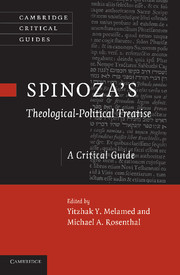Book contents
- Frontmatter
- Contents
- List of contributors
- Acknowledgments
- List of abbreviations
- Introduction
- 1 Spinoza's exchange with Albert Burgh
- 2 The text of Spinoza's Tractatus Theologico-Politicus
- 3 Spinoza on Ibn Ezra's “secret of the twelve”
- 4 Reflections of the medieval Jewish–Christian debate in the Theological-Political Treatise and the Epistles
- 5 The early Dutch and German reaction to the Tractatus Theologico-Politicus: foreshadowing the Enlightenment's more general Spinoza reception?
- 6 G. W. Leibniz's two readings of the Tractatus Theologico-Politicus
- 7 The metaphysics of the Theological-Political Treatise
- 8 Spinoza's conception of law: metaphysics and ethics
- 9 Getting his hands dirty: Spinoza's criticism of the rebel
- 10 “Promising” ideas: Hobbes and contract in Spinoza's political philosophy
- 11 Spinoza's curious defense of toleration
- 12 Miracles, wonder, and the state in Spinoza's Theological-Political Treatise
- 13 Narrative as the means to Freedom: Spinoza on the uses of imagination
- Bibliography
- Index
4 - Reflections of the medieval Jewish–Christian debate in the Theological-Political Treatise and the Epistles
Published online by Cambridge University Press: 10 January 2011
- Frontmatter
- Contents
- List of contributors
- Acknowledgments
- List of abbreviations
- Introduction
- 1 Spinoza's exchange with Albert Burgh
- 2 The text of Spinoza's Tractatus Theologico-Politicus
- 3 Spinoza on Ibn Ezra's “secret of the twelve”
- 4 Reflections of the medieval Jewish–Christian debate in the Theological-Political Treatise and the Epistles
- 5 The early Dutch and German reaction to the Tractatus Theologico-Politicus: foreshadowing the Enlightenment's more general Spinoza reception?
- 6 G. W. Leibniz's two readings of the Tractatus Theologico-Politicus
- 7 The metaphysics of the Theological-Political Treatise
- 8 Spinoza's conception of law: metaphysics and ethics
- 9 Getting his hands dirty: Spinoza's criticism of the rebel
- 10 “Promising” ideas: Hobbes and contract in Spinoza's political philosophy
- 11 Spinoza's curious defense of toleration
- 12 Miracles, wonder, and the state in Spinoza's Theological-Political Treatise
- 13 Narrative as the means to Freedom: Spinoza on the uses of imagination
- Bibliography
- Index
Summary
Modern research into the thought and writings of Baruch (Benedictus) Spinoza has revolved around many axes – historic, literary, philosophical, and others – using various tools, such as philosophical, philological, or political analysis. Two subjects which have occupied a number of researchers, especially Jewish ones, are (1) Spinoza's Jewish sources and, hence, the extent to which he belongs to the Jewish philosophical tradition; and (2) his attitude towards his original religion, Judaism, especially in comparison to his relation to the majority religion, Christianity. In light of these areas of research, it is of interest that scholars have yet to look at a body of Jewish writings that served as one of Spinoza's sources and, therefore, can illumine his attitude towards the two religions, namely medieval Jewish anti-Christian polemical literature (and its Christian counterpart). This Jewish literature, which began in the ninth century in Islamic countries and continued uninterrupted to Spinoza's era and beyond, reflects the debate between the two religions, both the official confrontation as seen in public disputations, such as Paris, 1240, and Barcelona, 1263, and the informal daily debates between Jews and Christians. Part of this literature was written as a reaction to Christian attempts to convert Jews to Christianity, and part was written as a result of a Jewish initiative without reference to the Christian mission. These polemical compositions are not literary and intellectual creations of the highest rank, yet they were a very popular genre that greatly influenced developments in Judaism, such as Jewish self-definition.
Keywords
- Type
- Chapter
- Information
- Spinoza's 'Theological-Political Treatise'A Critical Guide, pp. 56 - 71Publisher: Cambridge University PressPrint publication year: 2010



